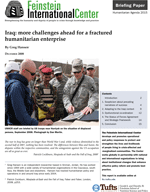Based on extensive field interviews in Iraq and neighboring Jordan, this briefing paper is an update of an earlier study on perceptions of humanitarian action in Iraq, which was part of the Humanitarian Action 2015 program.
The report draws upon five years of active monitoring in Iraq and the region, a relatively long period in which agencies have had many opportunities to adapt to a difficult context. The author argues that despite some improvements in security for Iraqis, the ability of the international community to provide for the most vulnerable is impaired by the continued politicization of humanitarian response and systemic deficiencies in coordination mechanisms. The report concludes that the both the UN system’s integrated mission approach and the UN’s relatively risk-averse security model have hampered the efficiency and effectiveness of the overall humanitarian response. Areas are highlighted where there are opportunities for improvement.
While the findings are those of the author, we believe this paper is a valuable contribution to the ongoing debate on the difficulties of providing humanitarian aid in asymmetrical war situations. It echoes the findings of a parallel study on Afghanistan.







